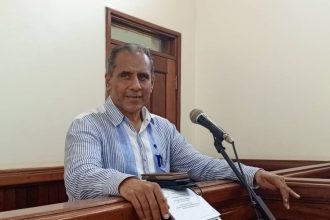Justice Lawrence Gidudu, the head of Uganda’s Anti-Corruption Court, has shed light on the court’s approach to handling intricate cases, often characterized by digitalized evidence.
Speaking at the inaugural National Court Open Day symposium organized by the Judiciary, held on Monday, April 15, 2024, at the Kololo Ceremonial Grounds in Kampala, Justice Gidudu emphasized the court’s reliance on database evidence over eyewitness testimony, distinguishing it from other courts.
Accompanied by judicial officers and officials from various justice-related entities, including the office of the Director of Public Prosecutions (ODPP), Police, Prisons, and the Judicial Service Commission, Justice Gidudu outlined the Anti-Corruption Court’s role in addressing syndicated crimes, which require extensive efforts to ensure a fair trial.
Highlighting the complexity of cases handled by the court, Justice Gidudu underscored the significance of digitalized evidence, stating that much of the evidence presented during trials is stored and retrieved from databases.
He noted that the implementation of Legal Instrument Number 11, also known as the Anti-Corruption Case Management Rules, has notably improved the court’s efficiency in adjudicating cases.
Despite being established in 2008, the Anti-Corruption Court has yet to fully embrace the use of plea bargaining, according to Justice Gidudu. He urged both the public and stakeholders to consider plea bargaining as an alternative to expedite case resolutions.
Plea bargaining entails an agreement between the prosecution and the defendant, where the defendant agrees to plead guilty to the charges in exchange for certain concessions.
Notably, the Anti-Corruption Court stands out as the only court in Uganda with fewer than 50 cases classified as backlog, indicating cases unresolved for over two years without conclusion, as per Judiciary records.
The Nakasero-based Anti-Corruption Court deals with a broad spectrum of cases, including bribery, embezzlement, abuse of office, fraud, money laundering, asset recovery, economic crimes, financial loss, corruption, nepotism, and tax evasion.




















